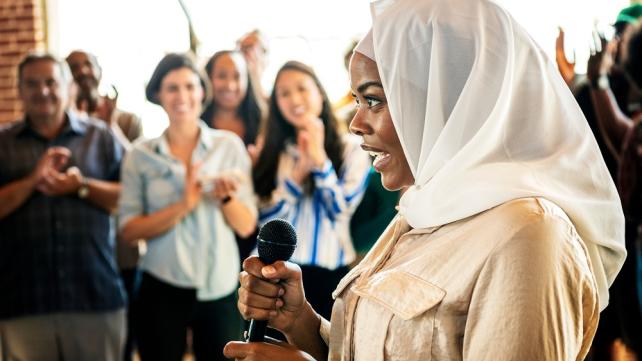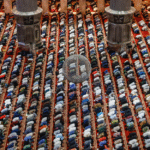The Muslim World is currently grappling with overwhelming challenges, including oppression, persecution, political instability, natural disasters, famine, disease, and even genocide. These issues collectively afflict the ummah, or Muslim community, and those believers who are directly and indirectly affected. When fellow Muslims suffer, every Muslim feels the emotional impact, especially when witnessing graphic images of these events via the news or social media. The Prophet Muhammad, peace and blessings be upon him, described the global Muslim community as “one body,” and this explains the phenomenon of mutual suffering experienced by Islam’s adherents in every corner of the Earth. In an authentic hadith, it is reported that he said:
“The parable of the believers in their affection, mercy, and compassion for each other is that of a body. When any limb aches, the whole body reacts with sleeplessness and fever.”
(Sahih Bukhari and Sahih Muslim)
Within the tumultuous landscape of today’s world, where global conflicts and geopolitical tensions dominate the headlines, Muslim families in the West find themselves at the intersection of faith and the trials of the modern age. Thankfully, there are opportunities for dialogue, education, and growth amidst the unfolding crises. Organizations like the Islamic Circle of North America’s WhyIslam project stand out as a beacon of light, working tirelessly to dispel stereotypes and misconceptions about Islam and Muslims. Their members, volunteers, and staff consist of young adults, working professionals, middle-aged men and women, and community elders, operating together in various areas of outreach. Their goal is the same: to spread a peaceful and genuine message of Islam fueled by the teachings in the Quran and Sunnah. Allah says:
“Invite ˹all˺ to the Way of your Lord with wisdom and kind advice, and only debate with them in the best manner. Surely your Lord ˹alone˺ knows best who has strayed from His Way and who is ˹rightly˺ guided.”
(Surah An-Nahl, 16:125)
Dawah: Light Amid Darkness
Dawah, an integral concept in Islam, refers to the call to Islamic monotheism or inviting others to embrace Islam. While WhyIslam is undeniably a dawah-driven organization, it is crucial to clarify that its primary objective is not centered around conversion. Instead, the organization, founded in 2000, is dedicated to disseminating accurate and unbiased information about Islam. By prioritizing the transmission of precise and authentic knowledge through simple, effective, and innovative means of communication, WhyIslam seeks to provide the public with an opportunity to learn about Muslims and Islam without the influence of anti-Muslim propaganda. Their mission statement encapsulates this commitment, emphasizing the importance of clarity and authenticity in presenting information about Islam. In aspiring to be a global leader in providing correct information about Islam, WhyIslam aligns its vision to foster understanding and refute misconceptions surrounding the Islamic faith.
Educating the public about Islam was the mission of Prophet Muhammad, peace and blessings be upon him, and even in the face of the worst adversities, he and his followers consistently remained on their mission to educate the masses about pure monotheism. Here are some ayahs of the Quran in which Allah commands the Prophets and their followers to remain steadfast when calling others to the true teachings of Islam:
1. “Say, ˹O Prophet,˺ “This is my way. I invite to Allah with insight—I and those who follow me. Glory be to Allah, and I am not one of the polytheists.” (Surah Yusuf, 12:108)
2. “Do not argue with the People of the Book unless gracefully, except with those of them who act wrongfully. And say, “We believe in what has been revealed to us and what was revealed to you. Our God and your God is ˹only˺ One. And to Him we ˹fully˺ submit.” (Surah Al-’Ankabut 29:46)
3. “Let there be a group among you who call ˹others˺ to goodness, encourage what is good, and forbid what is evil—it is they who will be successful.” (Surah Al-Imran, 3:104)
4. “It is out of Allah’s mercy that you ˹O Prophet˺ have been lenient with them. Had you been cruel or hard-hearted, they would have certainly abandoned you. So pardon them, ask Allah’s forgiveness for them, and consult with them in ˹conducting˺ matters. Once you make a decision, put your trust in Allah. Surely Allah loves those who trust in Him.” (Surah Al-Imran, 3:159)
5. “And whose words are better than someone who calls ˹others˺ to Allah, does good, and says, “I am truly one of those who submit?” (Surah Fussilat, 41:33)
The overarching theme of these verses from the Quran is to enjoin good and forbid evil by inviting others to explore Islam with an open mind and heart. Many additional lessons can be extracted from the Quranic guidance on dawah. Aside from inviting others to embrace Islamic monotheism, they emphasize the duty of believers to extend this invitation with clarity and conviction, understanding the importance of conveying the message with wisdom and respectful dialogue, even amidst disagreement. Central to this call is promoting goodness and discouraging evil within society, advocating for justice and righteousness, and opposing injustice and disbelief. Moreover, the verses emphasize the virtues of patience, forgiveness, and compassion in interactions with others, urging believers to deal gently with people, seek forgiveness, and consult with one another in matters of dispute. There is also an emphasis on standing firm in belief and action, affirming faith in Allah’s Oneness, actively educating others about Islam, and exemplifying faith through righteous deeds.
Muslims are called to invite humanity to the path of Allah with wisdom and fair preaching, grounding their discourse in knowledge and understanding. The Quran and Sunnah provide a comprehensive framework for inviting others to Islam, highlighting the principles of sincerity, compassion, wisdom, and steadfastness in conveying the message despite opposition. The Prophet, peace and blessings be upon him, encouraged his followers with the following advice:
“Convey from me even if it is (only) one ayah.”
(Sahih Bukhari)
Dawah and the Current Crisis
One of the most pressing conflicts of our times is still unfolding in the Holy Land, prompting individuals of diverse backgrounds, including non-Muslims, to explore the tenets of Islam. Since the aftermath of October 7, 2023, and Israel’s relentless offensive in the Gaza Strip, the resilience of the Palestinian people has sparked curiosity and admiration, leading many to seek a deeper understanding of the faith. WhyIslam has served as a crucial resource for those seeking accurate information about Islam in this turbulent climate. In recent months, the organization has seen a surge in requests from non-Muslims of all ages for free literature about Islam to understand the resilience of the people in Gaza.
During the March on Washington for Gaza that took place on January 13, 2024, thousands of protesters demonstrated in solidarity with Palestinians and called for an immediate ceasefire. The rally was organized with the assistance of ICNA and WhyIslam volunteers, who were present to distribute free Qurans and literature on Islam. Their information booths drew dozens of visitors looking to learn more about Muslim life, five of whom converted to Islam. According to statistics from ICNA, WhyIslam has received a new request for a free Quran every 6 minutes1 since October 7. In the past year, they have distributed over 100,000 Qurans in English and Spanish.
Regardless of these efforts, islamophobia remains a persistent challenge in the Western world, and even more so now as it is perpetuated by misinformation regarding the political dynamics of the Middle East. Anti-Muslim bias can take many forms, like verbal, mental, and even physical abuse, and anyone who appears Muslim may be targeted. Historically perpetuated through orientalist literature, biased media coverage, and stereotypical portrayals of foreign characters in film, islamophobia has now found new avenues of dissemination in the digital age. With the emergence of social media platforms, false information has become alarmingly prevalent, facilitated by algorithms that amplify sensational content and the ease of oversharing without adequate fact-checking. This rapid propagation of misinformation has further exacerbated existing prejudices and fuels the proliferation of Islamophobic narratives, highlighting the urgent need for more efforts to combat misinformation and promote an accurate understanding of Islam and Muslims.
It is crucial to urge the public to consider the intricate historical context and power dynamics inherent in the Israeli-Palestinian conflict and other tensions in the Muslim World. By actively addressing misconceptions, Muslims have the potential to reshape narratives and foster understanding in their communities. Fortunately, it is easier than ever for everyone, no matter what age, to get involved through social networking. Since its establishment, WhyIslam has evolved to include a social media presence, even recently joining the platform TikTok and skillfully utilizing engaging videos and reels to showcase a lighter and relatable side of Muslims and Islam, resonating particularly with younger audiences. Through these audiovisual materials, the WhyIslam social media team engages with audiences worldwide. This approach has garnered tens of thousands of views and sparked a surge in requests for free literature and information, highlighting the impact of their dynamic and inclusive online outreach efforts. A unique feature of this program is its potential to involve youth as volunteers and active followers, thus allowing younger generations to consume and share accurate information. Parents can encourage their children to get involved by participating in this or similar programs or starting their own dawah initiatives in their local communities.
At the heart of WhyIslam’s mission is promoting dialogue as a powerful tool to counter negative publicity and false information surrounding Islam. Through the organization’s multilayered approach, which includes organizing public events, creating media content for distribution, providing one-to-one email correspondence, and operating the 877-WHY-ISLAM hotline, WhyIslam actively engages with the public, fostering an environment of understanding and respect. The hotline serves as a free information resource, providing a wealth of knowledge about Islam and Muslims to a diverse audience. These tools are available to curious non-Muslims and Muslims who want to use them to help their friends and neighbors. Thankfully, there is no need to reinvent the wheel when it comes to dawah materials that are readily available for everyone to use.
In the face of global conflicts and the challenges of being Muslim in the West, WhyIslam’s commitment to promoting peaceful coexistence is evident. By offering free resources and actively engaging with the public, this organization becomes an invaluable ally for Muslim families navigating the complexities of today’s world. WhyIslam endeavors to build bridges of understanding between Muslims and their co-citizens by highlighting the similarities between Islam and other monotheistic religions like Christianity and Judaism. The organization emphasizes the shared values and love for humanity inherent in Islam, encouraging alliances and positive connections in a world often divided by misconceptions. Through their work, WhyIslam and other related organizations dispel myths and pave the way for meaningful dialogue, fostering a more inclusive and harmonious society for everyone, irrespective of their faith. They also offer material accessible to Muslim families that want to get involved in the fight against injustice and oppression worldwide.
If you and your family would like to counter Islamophobia and misinformation through dawah and obtain the materials or support to do so, visit https://icna-bazaar.myshopify.com/ or email info@whyislam.org.
Wendy Díaz is a Puerto Rican Muslim writer, award-winning poet, translator, and mother of six (ages ranging from infant to teen). She is the co-founder of Hablamos Islam, a non-profit organization that produces educational resources about Islam in Spanish (hablamosislam.org). She has written, illustrated, and published over a dozen children’s books and currently lives with her family in Maryland. Follow Wendy Díaz on social media @authorwendydiaz and @hablamosislam.














